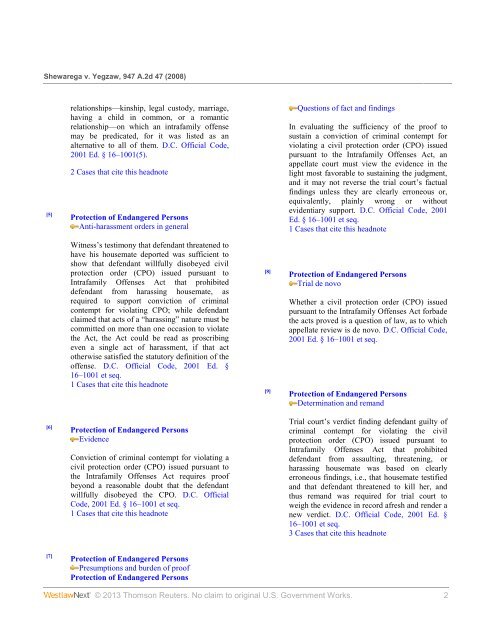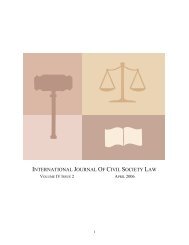<strong>Shewarega</strong> v. <strong>Yegzaw</strong>, 947 A.2d 47 (2008)[5]relationships—kinship, legal custody, marriage,having a child in common, or a romanticrelationship—on which an intrafamily offensemay be predicated, for it was listed as analternative to all of them. D.C. Official Code,2001 Ed. § 16–1001(5).2 Cases that cite this headnoteProtection of Endangered PersonsAnti-harassment orders in generalQuestions of fact and findingsIn evaluating the sufficiency of the proof tosustain a conviction of criminal contempt forviolating a civil protection order (CPO) issuedpursuant to the Intrafamily Offenses Act, anappellate court must view the evidence in thelight most favorable to sustaining the judgment,and it may not reverse the trial court’s factualfindings unless they are clearly erroneous or,equivalently, plainly wrong or withoutevidentiary support. D.C. Official Code, 2001Ed. § 16–1001 et seq.1 Cases that cite this headnoteWitness’s testimony that defendant threatened tohave his housemate deported was sufficient toshow that defendant willfully disobeyed civilprotection order (CPO) issued pursuant toIntrafamily Offenses Act that prohibiteddefendant from harassing housemate, asrequired to support conviction of criminalcontempt for violating CPO; while defendantclaimed that acts of a “harassing” nature must becommitted on more than one occasion to violatethe Act, the Act could be read as proscribingeven a single act of harassment, if that actotherwise satisfied the statutory definition of theoffense. D.C. Official Code, 2001 Ed. §16–1001 et seq.1 Cases that cite this headnote[8][9]Protection of Endangered PersonsTrial de novoWhether a civil protection order (CPO) issuedpursuant to the Intrafamily Offenses Act forbadethe acts proved is a question of law, as to whichappellate review is de novo. D.C. Official Code,2001 Ed. § 16–1001 et seq.Protection of Endangered PersonsDetermination and remand[6]Protection of Endangered PersonsEvidenceConviction of criminal contempt for violating acivil protection order (CPO) issued pursuant tothe Intrafamily Offenses Act requires proofbeyond a reasonable doubt that the defendantwillfully disobeyed the CPO. D.C. OfficialCode, 2001 Ed. § 16–1001 et seq.1 Cases that cite this headnoteTrial court’s verdict finding defendant guilty ofcriminal contempt for violating the civilprotection order (CPO) issued pursuant toIntrafamily Offenses Act that prohibiteddefendant from assaulting, threatening, orharassing housemate was based on clearlyerroneous findings, i.e., that housemate testifiedand that defendant threatened to kill her, andthus remand was required for trial court toweigh the evidence in record afresh and render anew verdict. D.C. Official Code, 2001 Ed. §16–1001 et seq.3 Cases that cite this headnote[7]Protection of Endangered PersonsPresumptions and burden of proofProtection of Endangered Persons© 2013 Thomson Reuters. No claim to original U.S. Government Works. 2
<strong>Shewarega</strong> v. <strong>Yegzaw</strong>, 947 A.2d 47 (2008)Attorneys and <strong>Law</strong> Firms*49 David Carey Woll, Wheaton, MD, was on the brief,for appellant.Appellee did not submit a brief.Linda Singer, then Attorney General of the District ofColumbia, Todd S. Kim, Solicitor General, RosalynCalbert Groce, Deputy Solicitor General, and Sidney R.Bixler, Assistant Attorney General, filed a brief on behalfof the District of Columbia as amicus curiae.Before GLICKMAN and THOMPSON, AssociateJudges, and TERRY, Senior Judge.OpinionGLICKMAN, Associate Judge:Sisay <strong>Shewarega</strong> appeals his conviction of criminalcontempt for willfully disobeying a civil protection order(CPO) issued pursuant to the Intrafamily Offenses Act. 1Appellant argues that his contempt conviction must bereversed because the CPO was void ab initio for lack ofsubject matter jurisdiction, and alternatively forinsufficient proof that he violated the CPO. We rejectappellant’s jurisdictional argument. We conclude, thoughit is a close question, that there is sufficient evidence inthe record to support appellant’s contempt adjudication.However, because the trial court’s determination rests onfactual findings that are clearly erroneous, we mustremand for the court to reconsider its verdict after anaccurate assessment of the trial record.I.(A) to whom the offender is related by blood, legalcustody, marriage, having a child in common, orwith whom the offender shares or has shared amutual residence; or(B) with whom the offender maintains or maintaineda romantic relationship not necessarily including asexual relationship. A person seeking a protectionorder under this subparagraph shall reside in theDistrict of Columbia or the underlying intrafamilyoffense shall have occurred in the District ofColumbia.[[[[[ 3 ]In her petition for a CPO, appellee Kidist <strong>Yegzaw</strong> allegedthat she and appellant *50 shared the same residence—aboarding house owned and occupied by appellant, inwhich she rented a room—and that appellant hadcommitted an intrafamily offense by assaulting andthreatening her.After holding a hearing, the trial court granted Ms.<strong>Yegzaw</strong>’s petition. The CPO, issued on April 21, 2006,recites the court’s findings of jurisdiction over the partiesand subject matter, and of good cause to believe thatappellant had committed an intrafamily offense.Appellant was ordered not to “assault, threaten, harass, orstalk Petitioner, or destroy Petitioner’s property.”Appellant was not barred from otherwise contacting orcommunicating with Ms. <strong>Yegzaw</strong>. The CPO, whichappellant signed, warned that if he did not comply with itsterms, he would be subject to prosecution for civil orcriminal contempt. 4 Appellant did not appeal the entry ofthe CPO.Less than three weeks later, Ms. <strong>Yegzaw</strong> moved the courtto adjudicate appellant guilty of criminal contempt. Shealleged that appellant had violated the CPO on May 8,2006, by knocking forcefully on her bedroom door,yelling and screaming at her, and making threats to gether deported to her native country and to kill her.The statutory predicate for issuance of a CPO is a findingof good cause to believe that the respondent hascommitted or is threatening to commit an “intrafamilyoffense” within the meaning of D.C.Code § 16–1001(5). 2At the time of the events at issue here, that statute definedan “intrafamily offense” as follows:The term “intrafamily offense” means an actpunishable as a criminal offense committed by anoffender upon a person:Appellant moved to dismiss the contempt proceeding onthe ground that the Superior Court lacked jurisdiction toissue the CPO. At the hearing on the motion, appellanttestified, and Ms. <strong>Yegzaw</strong> agreed, that they never had afamilial, romantic, or intimate personal relationship ofany kind; their only relationship was one of landlord andtenant at the rooming house where they both resided. TheCPO was void for want of jurisdiction, appellant argued,because the Intrafamily Offenses Act had not been and (asits title suggests) should not be construed to apply to suchimpersonal relationships. The trial court rejected thisargument, and denied appellant’s motion, in view of© 2013 Thomson Reuters. No claim to original U.S. Government Works. 3
















